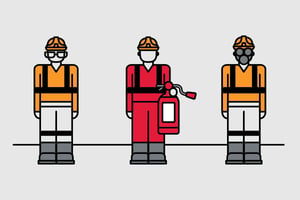 Your emergency preparedness plan is crucial in helping your team prevent disasters before they strike. This plan not only includes the overall strategy, but also outlines specific employee roles and a potential approach to testing the plan before it's put in place.
Your emergency preparedness plan is crucial in helping your team prevent disasters before they strike. This plan not only includes the overall strategy, but also outlines specific employee roles and a potential approach to testing the plan before it's put in place.
Review the checklist below to evaluate your emergency preparedness management plan and ensure your team is ready for any emergency—big or small—before it happens.
Emergency Planning
- Do you have an emergency preparedness management plan in place?
- Are specific roles and stakeholders named in your plan, so that everyone knows their role?
- Is there a dedicated leader for your emergency preparedness and response program?
- Is your plan regularly reviewed and approved by all roles involved in the response and any other necessary stakeholders?
- Is your plan reviewed at least annually?
- Does your plan include sections for mitigation, response and recovery?
- Have you identified the specific risks your facility could face, alongside the likelihood and impact of each risk?
- Does your plan suggest specific actions to take in order to prevent each likely risk?
- Are local, state and federal emergency agencies aware of the unique risks of your facility before responding to an emergency?
- Is there a budget for emergency planning, purchasing the right equipment and completing repairs?
Employee Readiness
- Are all employees able to easily access the plan?
- Are employees divided between essential and non-essential status?
- Do employees know their status?
- Are employee representatives involved in drafting and reviewing your plans?
- Are all employees trained on the plan and their roles/responses?
- Is regular training provided and encouraged across the company?
- Are select employees trained specifically on emergency response or first aid?
Testing the Plan
- Do your employees regularly run drills to test plans and responses?
- Do these drills actually replicate real situations, so that employees react realistically?
- Are drills conducted randomly, rather than on a regular schedule?
- Does your plan include what a successful test and response looks like?
- Is the plan updated after each drill to reflect gaps or necessary changes?
Please note this list is not comprehensive of all of the steps you may need to take to prepare for emergencies, but each question can and should be answered as part of your plan.
The information contained in this article is intended for general information purposes only and is based on information available as of the initial date of publication. No representation is made that the information or references are complete or remain current. This article is not a substitute for review of current applicable government regulations, industry standards, or other standards specific to your business and/or activities and should not be construed as legal advice or opinion. Readers with specific questions should refer to the applicable standards or consult with an attorney.









Leave a Reply
Comment policy: We love comments and appreciate the time that readers spend to share ideas and give feedback. However, all comments are manually moderated and those deemed to be spam or solely promotional will be deleted.